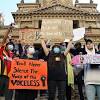I Am a Skeptical Swiftie. Taylor Deserves More of Us.

I have a vivid memory of sitting in a friend’s bedroom, a group of five or six girls singing along to “You Belong With Me.” We were sophomores in high school, a year of mixing Sweet 16 parties and school dances with whatever alcohol we could steal from our parents’ liquor cabinets.
I felt out of place in that bedroom. Taylor Swift wrote lyrics that didn’t speak to my experience growing up in the far reaches of Philadelphia. Their small-town—and at times small-minded—themes turned me off in a way I couldn’t articulate as someone who spent weekends drinking in the woods and lusting after boys with lip rings and swooped hair instead of football players with shoulder pads and prom king crowns.
But I wanted to be different. I listened to pop punk and tried to flirt with boys using my music knowledge. It was the original pick-me girl playbook, but the boys never did pick me. There was always someone effortlessly cooler or prettier.
I may have been the core demographic for Swift’s lyrics, but for a long time they sat squarely at the other end of the “not like other girls” spectrum, which is, I think, what made me avoid her for so long. In 2012, when I was 19 years old, I simply tweeted “Taylor Swift sucks”— a sentiment I held on to for at least another few years.
But when I was a senior in college, I finally caved. 1989 soundtracked my first-semester final exams, and it was on repeat for weeks after that.It was a few months after the album had been released, but only a week or so since Swift had taken the stage at the 2014 Victoria’s Secret Fashion Show.
Sitting on the scratchy blue living room couches found in student housing across the country, my roommates and I saw models strut their impossible bodies up and down the runway. Watching the show was a masochistic act for any young woman who had grown up in the tabloid era.
To be a woman is to be compared: to one another, to a younger version of oneself, to a version of oneself who doesn’t exist. Even the most visible women don’t escape these comparisons, and in the early aughts, celebrity women were constantly under a microscope, most often for their appearance and more specifically for their weight.
Although 1989 was a mainstream triumph for Swift, she was still facing down the same tabloid coverage that seemingly defined much of her early career. Gossip columnists loved to tear her down as a serial dater, criticizing her for writing only about her relationships and accusing her of dating to develop fodder for new music. Soon, that fodder would turn to her bubbling feud with Kanye West and an era of rumors that would shape her next project, Reputation.
1989 was also the album that turned me into a true fan—even if I didn’t feel like all the others.
The gossip mag coverage alone would’ve been enough to make Scott Borchetta, the Big Machine exec who’d taken a chance on signing Swift at 15, look like a music industry genius. But beyond the attention, Swift was actually talented,evidenced by her growing collection of awards and, eventually, by winning over skeptics like me after years of swearing off her music. She began by excelling attapping into the interior lives of young female country music fans in a way that Rascal Flatts and Kenny Chesney could not, then expanded into the lives of so many more.
Swift’s early career was scripted almost as a counter to the sexualized pop stars of the late ’90s and early 2000s. She wrote about coming of age as a girl in America. Her lyrics largely mimicked the storybook romances and heartbreaks that had been the blueprint for decades, even if you didn’t look like Swift—white, blond, middle-class.
It’s aspirational content, dreamed up by a largely homogenous group, not unlike the influencers we’ve grown so used to seeing splashed across our social media feeds who shill the same products in identical apartments.
As Swift grew up, though, she was still playing the part of teenage heartbreaker and heartbroken. And maybe that’s part of the magic of reflection, writing about the past as if it’s the present, creating an undeniable record for others going through the same thing to experience in real time. And despite my admiration, my skepticism still spiked anytime I heard her sing—again—about falling and failing in love. The tabloid drama and her lyrics seemed to converge on a path, as if Swift were saying: I’m writing this story.
That she controlled the narrative became even more evident as the years went on. Taylor Swift the Product and Taylor Swift the Person were indistinguishable from each other. When your personal brand runs parallel to the work you’re producing, it’s easy to intertwine the two to a point of no return.
In 2017 Swift told us, during the Reputation era, “We think we know someone, but the truth is that we only know the version of them that they have chosen to show us.” Neither you nor I will ever be close enough to Swift to learn which of her relationships were genuine and which were simply for the cameras. And realizing the truth of what happened behind the scenes would ruin the illusion of Swift that we’ve come to accept.
That’s because being a true Swiftie, according to some, requires an almost complete suspension of disbelief. Every album rollout is peppered with clues and Easter eggs. Every lyric has subtext, and even the subtext has a double meaning. Swifties have been compared with conspiracy theorists and QAnon believers. It’s been suggested that they could solve any number of ills facing the world simply through sheer force of determination.
The strength of Swifties has proved to be a boon to world economies, causing business and marketing experts to acknowledge, just as Borchetta did all those years ago when he signed Swift, the power that women—and, more specifically, young girls—have in shaping pop culture. (See also: Beatlemania, etc., etc.)
Slowly, but then all at once, I became one in the sea of young women helping to propel Swift’s star. Even if I’m a reluctant Swiftie.
Entire case studies could be written about the fated sale of Swift’s masters that eventually led the singer to re-record her first six albums originally released under that Big Machine contract. The saga reads like a soap opera, appropriate for a career that has been documented and overexamined by both the tabloids and her fans.
By 2019, Reputation might have been in the rearview mirror, but Swift was clearly in her revenge era. She was asserting her dominance in an industry that consistently takes advantage of artists. The moves were perhaps best personified in Swift’s song “The Man,” on Lover, her first release under the Universal Music Group deal.
The Miss Americana documentary released on Netflix in 2020 also showed the effect losing had on her after she walked away from the Grammys empty-handed for Reputation. She declared that it wouldn’t happen again. The film shows her fighting, teary-eyed, with her dad about politics. Specifically, she came out against Republican candidates in her home state of Tennessee who were running on platforms that were squarely against Swift’s self-proclaimed feminism.
She was giving viewers a vulnerable look behind the curtain of the Product she’s been curating and selling for years, finally emboldened to show more of the Person pulling the strings.
Then COVID-19 happened, canceling Swift’s planned “Lover Fest” but eventually bestowing upon her rabid fan base a pair of surprise albums that deviated so far from her established sound they actually drew some lapsed Swifties back in. For others, like me, the release of Evermore and Folklore felt like an appropriate evolution for Swift, who at this point was in her early 30s and aging out of the high school tropes that had shaped so much of her initial work.
Swift was reprising the complex songwriting talent that had been written off by her earliest critics and adopting a new sound, courtesy of now-frequent collaborators Aaron Dessner and Jack Antonoff. She was looking outside herself, perhaps for the first time. With no promotion, and no hints that pointed to breadcrumbs left in her own life, the pandemic-era Swift mostly eschewed the coded language and Easter eggs that had become so familiar to her longtime fans.
Pandemic-era Swift was beginning her ascent to a career high that no artist before her had ever reached and no artist after her will likely ever match. Those two albums brought countless new fans into the fold, and the re-recorded albums set Swift up to make and break records, some of which hadn’t even existed before, as if she’d willed them into being.
A decade and a half after swearing off Taylor Swift, I found myself on the floor of Lincoln Financial Field, in Philadelphia, for the first of three nights of the “Eras” tour. I left the stadium covered in tears, sweat, and glitter, extolling the sheer artistry and athleticism of the performance.
The tour was also the first, and possibly only, time I felt welcome to the Swiftie fandom. Rarely does an artist get to joyfully reflect on their own career the way Swift did on that stage. She celebrated every step of her journey to the top, and in doing so she welcomed fans regardless of the era they’d jumped on the bandwagon. In the crowd, we were all Swifties, no matter if you reserved space in your brain for every Easter egg.
Taylor Swift has built an empire, and with that comes a loyal fan base standing at the ready to defend. I can see why: The artist has batted away bullies and rumors for more than half her life. Any public figure will tell you it comes with the territory, but when you’ve made it part of your brand to encourage your audience to overanalyze your every breath, it’s fair game.
She’s invited her fans to develop encyclopedic knowledge of the pieces of herself that she has shared, and parts she hasn’t shared have been dissected out of her word choices and imagery by this increasingly militant group. But at the end of the day, Swift the Person still exists outside the Product that she has overwritten and her fans have overconsumed.
Part of the reason Swift’s product has grown so powerful is because of her ability to position herself as an everywoman, an underdog, constantly fighting against the man holding her back or pinning her down. That could be any of the interchangeable tabloid relationships from her past, the constraints of her contract with Big Machine, her clash with Kanye, or the suffocating nature of her six-year relationship that ended without the wedding she had seemingly hoped for—and sang longingly about for years.

Luke Winkie
Brace Yourselves: A New Wave of Taylor Swift Coverage Is Coming
Read MoreBut after over two decades of ascension, there is no more Man to conquer: Swift stands alone atop the music industry and pop culture more broadly as the single most influential persona at work today.
- The Biggest Names in Hip-Hop Are Embroiled in an Epic Beef. What’s Going On?
- The NBA Just Banned a Player for Life. It Had No Choice.
- Adults Have Declared a Kids Show Special One of the Best TV Episodes Ever. I Think I Know Why.
- Fox News Is Losing Its Mind Over the New “Woke” Scrabble. I Actually Played It. Guess What?!
On The Tortured Poets Department, she nods to her desire to be everything to everyone, singing: “All the piеces of me shatterеd as the crowd was chanting, ‘More.’ ” She’s acknowledging the overwritten character that’s a product of her own making.
Swift herself told us that this was an album she needed to write for herself, declaring in an Instagram caption, “Once we have spoken our saddest story, we can be free of it.”
She’s begging to be freed of the Product that built her empire. She’s no longer an underdog, but you wouldn’t know it from the way her most die-hard fans defend her against the slightest hints of criticism. The artistry that built the empire deserves an audience filled with more people like me, who offer something beyond the guarantee of record-breaking album sales and streams. Skeptical Swifties leave the parasocial relationships with Taylor the Person at the door without discounting the work she’s put in to become the Taylor we know and (mostly) love. And a few tracks on Tortured Poets suggest that she might just be ready for us.


 Australia
Australia Argentina
Argentina  Austria
Austria  Brazil
Brazil  Canada
Canada  Germany
Germany  Ireland
Ireland  Italy
Italy  Malaysia
Malaysia  Mexico
Mexico  New Zealand
New Zealand  Poland
Poland  South Africa
South Africa  United Kingdom
United Kingdom  United States
United States 
























